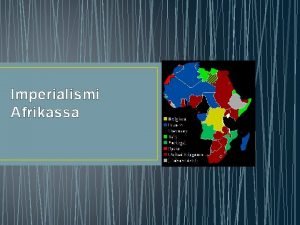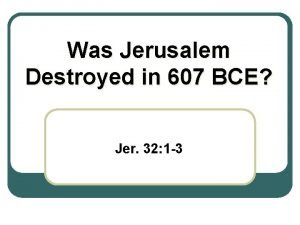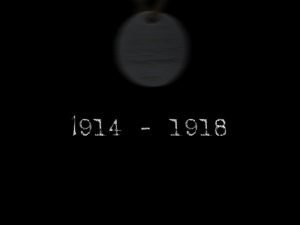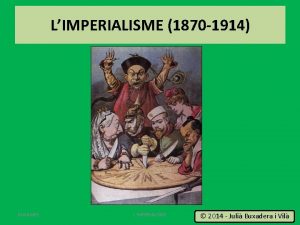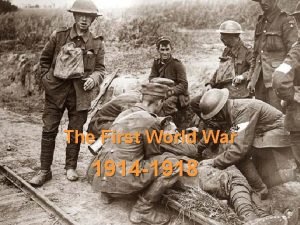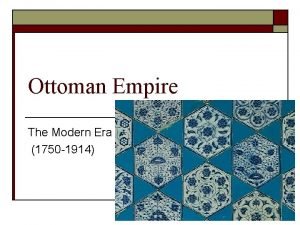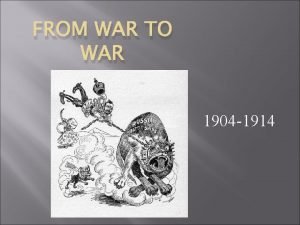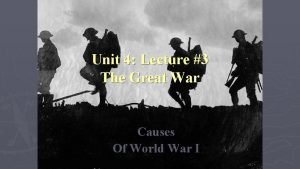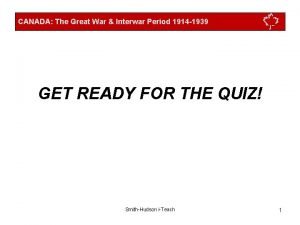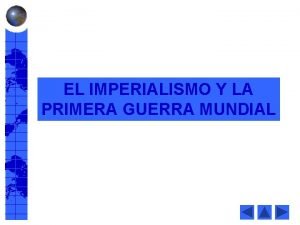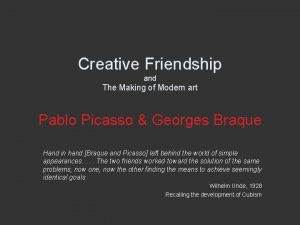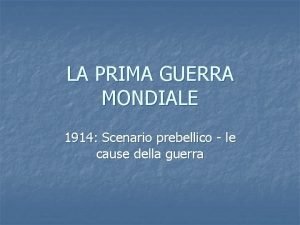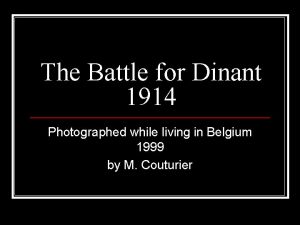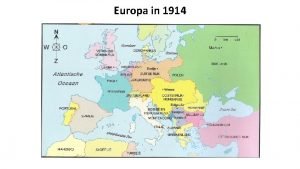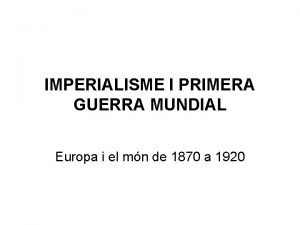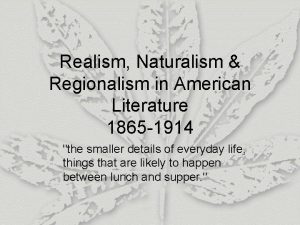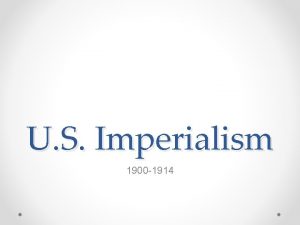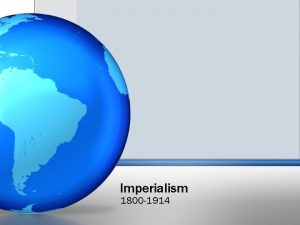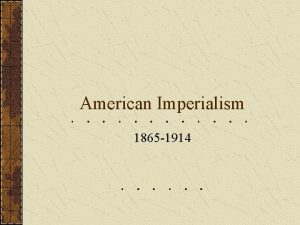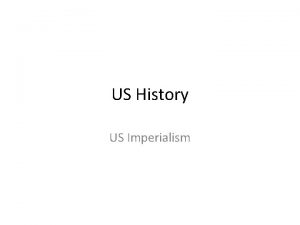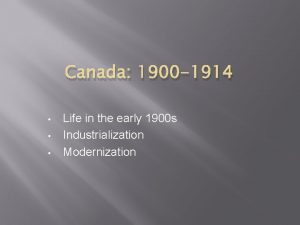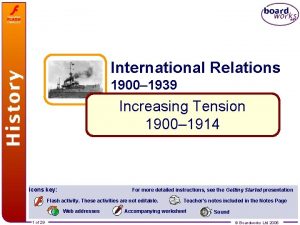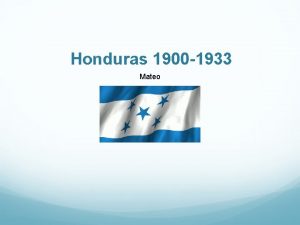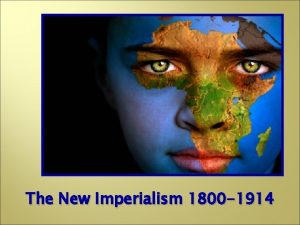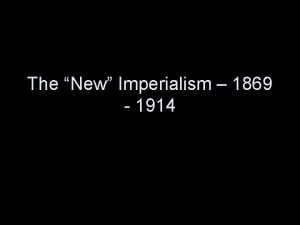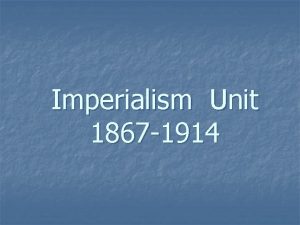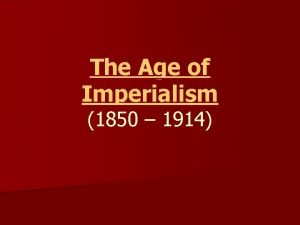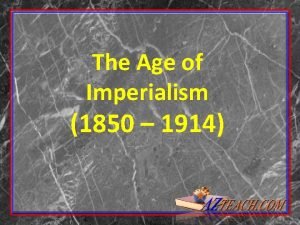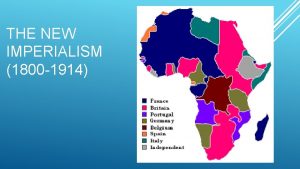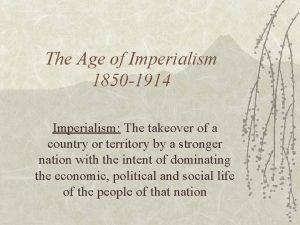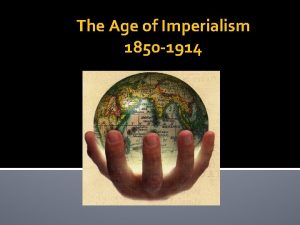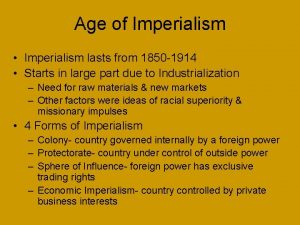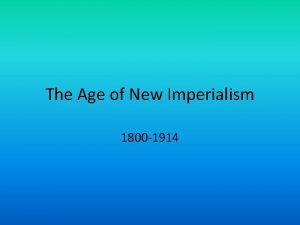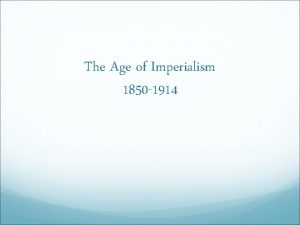U S Imperialism 1900 1914 Reasons for Imperialism






























- Slides: 30

U. S. Imperialism 1900 -1914

Reasons for Imperialism • Colony: When a country settles another area of the world in order to o 1. Exploit natural resources o 2. Bring religion o 3. have strategic military bases • By 1900 much of the world had been carved up by Western Europe • There were economic, social, and military reasons for imperialism

Social Reasons • One social reason was many felt in Europe and America that it was the “White man’s burden” to “Civilize” the world • Europe believed that colonizing Africa and Asia would allow them to teach the natives how to be “civilized” • Another social reason in America was that by 1900 the frontier is considered closed and Imperialism was seen as the new frontierso Imperialism is seen as a way to expand the frontier

Economic Reasons • Mercantilism is the belief that in order for a country to gain wealth they must 1. 2. 3. 4. 5. Gain raw materials by colonizing Asia and Africa Industrialize Export raw materials to countries that do not have them Have a high tariff to force your people to buy what your country makes Sell finished good to your colonies and prevent them from buying from other countries

Military Reasons • Strategic areas around the world were taken in order to o protect trade o provide coal refueling areas for warships • T. Roosevelt felt that the U. S. should strengthen the navy by building modern warships • He oversaw the construction of the Great White Fleet • Roosevelt ordered the fleet to sail around the world to demonstrate America’s global reach

European Imperialism

Scramble for Africa • Britain, France, Belgium, Italy, and Portugal will colonize Africa for its natural resources • This was made possible because of the development of the machine gun and quinine • Germany will eventually begin to colonize Africa as well in order to demonstrate their strength • Britain and France will oppose German expansion and this will lead to tension


Dividing of China • Russia, Germany, Japan, Britain, and France will seize ports in China and demand that their citizens have special privileges in these trading ports. • The Chinese emperor became a puppet in the hands of these foreign powers which led to hatred of foreigners among the Chinese • Eventually the Chinese will rebel against the powers, this is known as the Boxer Rebellion • The Boxers will massacre 300 foreigners, this will lead to an allied army made up of all foreign groups (including Americans) to attack and kill the rebels

Boxers

Open Door Policy 1. 2. 3. America wanted to protect new territories in the Philippines and its citizens in China America also wanted to trade with China and not be pushed out by European powers The Open Door Policy was the American plan it stated a) b) c) Was created by a note sent from Secretary of State John Hay, known as the Open Door Note China may trade with the U. S. and other nations and not be carved up like Africa China was still exploited by European nations and the U. S. for resources and markets

Imperialism


American Imperialism

Early U. S. Imperialism • In 1867 secretary of state William Seward purchased Alaska from the Russians in what was known as “Seward’s Folly” because everyone thought it was worthless • Seward laughed last however when there was gold discovered and later oil.


• • • Hawaii In 1898, before the Spanish American War, Hawaii was ruled by Queen Liliuokalani Hawaii was a key place for American Ships to stop for provisions on the way to Asia However because of a U. S. sugar tariff the American Planters deposed her and asked America to annex Hawaii Cleveland was reluctant, but Mc. Kinley will annex the island America will use Pearl Harbor, the best natural harbor in the pacific to base its Pacific Fleet

The Spanish American War

Causes of the Spanish-American War 1. Cubans will rebel against poor Spanish rule 1. Spain sent 150, 000 troops 2. Moved Cubans to concentration camps 2. Yellow Journalists such as Joseph Pulitzer, and William Randolph Hearst exaggerated the stories of Spanish atrocities Many wanted the U. S. to take a tougher stance against Spain The U. S. sent the Battleship Maine to observe events in Cuba When the Maine exploded in Havana Harbor in Cuba the U. S. blamed Spain, even though it was an accident, soon after war is declared 3. 4. 5.

• American troops were sent to Cuba and easily defeated the unprepared Spanish • The most famous battle will be the Battle of San Juan Hill in which Teddy Roosevelt and his Rough Riders will storm the hill giving him fame and war experience - This will be the first post Civil War conflict for America and many will see it as an example of America moving past the Civil War and unifying again

Spheres of Influence

Philippines • Commodore Dewey was sent to the Philippines even before the war started and quickly destroyed the Spanish navy in Manila Bay • With this destruction Spain lost its final colonies in the Pacific and the Caribbean ending 400 years of colonialism • The U. S. will seize the Philippines making it a U. S. territory • The Filipinos will rebel after their promised self-rule never happened

The End of the War • The U. S. forced Spain to sign the treaty of Paris 1898 which gave Cuba its independence and the Philippines, Guam, and Puerto Rico to the U. S. • Some wanted to annex Cuba, but the Teller Amendment was added to Mc. Kinley’s war message which said the U. S. could not annex Cuba • There were many who felt it was unsafe for Cuba to be on its own so the U. S. would maintain a naval base in Guantanamo Bay Cuba

America’s Foreign Policy After the Spanish American War

Big Stick Diplomacy • Roosevelt believed in big stick diplomacy (speak softly and carry a big stick) • This was the idea that all of America’s actions should come with a threat of force • Examples include the Venezuela incident in 1902 where Britain and Germany blockaded Venezuela over debts owed • America added the Roosevelt Corollary to the Monroe Doctrine which stated • “The United States will intervene in conflicts between European countries and Latin American countries to enforce legitimate claims of the European powers, rather than having the Europeans press their claims directly. ” • In the end the European nations backed down

Panama Canal • To get the land for the Panama canal we will ask Columbia, they will say no. • So we will encourage a revolution in Panama, after they form a new government we get the land in payment. • In 1904 we will begin the project and it will be complete in 1914. • This will greatly strengthen the U. S. position in the world because we will be in control of the canal


Russo-Japanese War • In 1908 Japan will attack Russia in order to gain land better access to Manchuria (northern China) • No eastern nation had ever defeated a western nation • Roosevelt feared that would upset the balance of power in Asia • Roosevelt arbitrates the dispute, Japan is given land Roosevelt gets a Nobel Peace Prize

Dollar Diplomacy • This is the idea that American will use its economic power to give money and guarantee loans in Latin America and Asia in order to get friendly governments • This sometimes involved using American military to overthrow unfriendly governments first like in Nicaragua

Moral Diplomacy • This was the idea promoted by Wilson that the U. S. would only support nations whose moral beliefs were similar to America’s • Generally it was used to support nations with democracies and oppose un-democratic nations • This was supported by the idea of American Exceptionalism • This will help lead to a minor conflict with Mexico during the Mexican Revolution • This conflict will lead to Poncho Villa attacking New Mexican towns and the American army under general Jack Pershing entering Mexico to hunt down Villa
 Imperialism map 1914
Imperialism map 1914 Imperialism definition ww1
Imperialism definition ww1 Old imperialism motives
Old imperialism motives Old imperialism vs new imperialism chart
Old imperialism vs new imperialism chart Imperialismi afrikassa
Imperialismi afrikassa Bce
Bce Srbija od 1903 do 1914
Srbija od 1903 do 1914 Eastern front ww1 map
Eastern front ww1 map Braves
Braves Efg 1914
Efg 1914 Lasted until 1914
Lasted until 1914 Hrvatski ekspresionizam
Hrvatski ekspresionizam Buxaweb imperialisme
Buxaweb imperialisme Colonial empires 1914
Colonial empires 1914 La treve de noel 1914 film
La treve de noel 1914 film Ottoman empire 1914
Ottoman empire 1914 1904-1914
1904-1914 Born on may 12, 1914, in dallas, texas.
Born on may 12, 1914, in dallas, texas. Ma jolie
Ma jolie Wtd unit 4 1914 beach road malaga wa 6090
Wtd unit 4 1914 beach road malaga wa 6090 1914 1918
1914 1918 Colonial empires 1914
Colonial empires 1914 V
V Picasso ma jolie 1914
Picasso ma jolie 1914 Sarajevo 28 giugno 1914
Sarajevo 28 giugno 1914 Dinant 1914
Dinant 1914 Ottomaanse rijk 1914
Ottomaanse rijk 1914 Moda anilor 1930
Moda anilor 1930 Igauņu režisors 1914 92
Igauņu režisors 1914 92 Causas de la primera guerra mundial imperialismo
Causas de la primera guerra mundial imperialismo Realism and regionalism in american literature
Realism and regionalism in american literature




